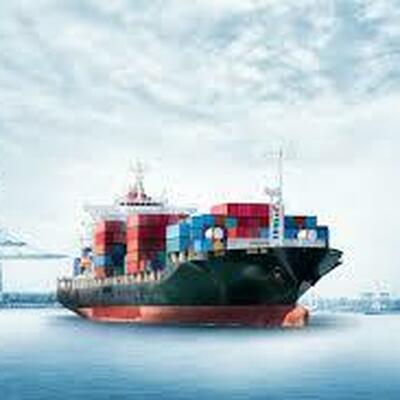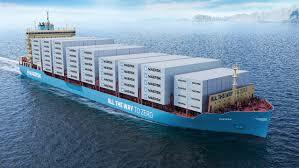Notifications
ALL BUSINESS
COMIDA
DIRECTORIES
ENTERTAINMENT
FINER THINGS
HEALTH
MARKETPLACE
MEMBER's ONLY
MONEY MATTER$
MOTIVATIONAL
NEWS & WEATHER
TECHNOLOGIA
TV NETWORKS
VIDEOS
VOTE USA 2026/2028
INVESTOR RELATIONS
COMING 2026 / 2027
ALL BUSINESS
COMIDA
DIRECTORIES
ENTERTAINMENT
FINER THINGS
HEALTH
MARKETPLACE
MEMBER's ONLY
MONEY MATTER$
MOTIVATIONAL
NEWS & WEATHER
TECHNOLOGIA
TV NETWORKS
VIDEOS
VOTE USA 2026/2028
INVESTOR RELATIONS
COMING 2026 / 2027
About Me
 Seanautic Marine
Seanautic Marine Seanautic Marine Inc. ECTN-Africa is an independent service provider for all Cargo Tracking Note (CTN) from any worldwide origin to 22 African ECTN mandatory Countries.

Posted by - Seanautic Marine \
Apr 21 \
Filed in - Business \
336 views \ 0 comments \ 0 likes \ 0 reviews
As global trade continues its digital transformation, the question on many stakeholders' minds is whether emerging economies like Burkina Faso are ready to embrace disruptive technologies such as blockchain. With the increasing integration of electronic Cargo Tracking Notes (ECTNs) across Africa, particularly ECTN Burkina Faso, the potential for digital disruption is no longer hypothetical—it's imminent.
In this article, we dive into the intersection of blockchain and the Burkina Faso ECTN system, examining whether the country is prepared for this technological evolution and what it could mean for trade, transparency, and economic development in 2025.
What Is the ECTN System?
The Electronic Cargo Tracking Note (ECTN) is a digital document required for all shipments heading to specific African countries, including Burkina Faso CTN. It serves as a pre-shipment declaration tool that helps governments and customs authorities monitor, validate, and regulate cargo entering their ports. It reduces smuggling, enhances data accuracy, and ensures compliance with national and international shipping laws.
In practice, an ECTN includes key data such as the shipper's information, cargo details, shipping route, and arrival estimates. Once validated, the document becomes a mandatory reference for customs clearance at the destination.
Over time, countries like ECTN Burundi, ECTN Benin, and ECTN Guinea have adopted similar systems, standardizing processes and streamlining maritime logistics. But even with such advancements, traditional ECTN systems are still largely dependent on centralized databases, which presents notable inefficiencies and vulnerabilities.
Blockchain 101: Why It Matters for ECTN
Before diving into its application, it helps to understand what blockchain actually is. At its core, blockchain is a decentralized ledger that records transactions in a secure, transparent, and immutable way. Each block of data is cryptographically linked to the previous one, forming a chain that can’t be tampered with easily.
For ECTN systems, blockchain could introduce significant upgrades:
Transparency: Every transaction or update is recorded and visible to all authorized stakeholders.
Security: The decentralized structure makes it difficult for any single party to alter data without detection.
Efficiency: Automated verification through smart contracts could reduce processing times and eliminate middlemen.
These are not just theoretical benefits. Real-world applications in countries like Singapore and the UAE show that blockchain in logistics can reduce fraud, cut costs, and enhance trust among parties.
Is Burkina Faso Ready for Blockchain in ECTN?
Now comes the pressing question: Is ECTN Burkina Faso equipped for this kind of digital leap?
Let’s break this down by looking at three key areas: infrastructure, policy, and ecosystem readiness.
Burkina Faso, a landlocked country in West Africa, faces significant infrastructure challenges. According to the World Bank, internet penetration stood at just 22% in 2023. Moreover, power outages and inconsistent broadband access continue to plague businesses.
However, progress is being made. The government has launched several digital inclusion initiatives to extend high-speed internet access to rural and urban areas. In addition, the creation of digital hubs in Ouagadougou is fostering tech literacy and innovation.
If blockchain-based ECTN is to take off, investments in digital infrastructure must remain a top priority.
The success of blockchain also hinges on strong, adaptive policy frameworks. Burkina Faso is still in the early stages of formulating regulations around emerging technologies. While some ministries have shown interest in digital governance, there’s no comprehensive policy supporting blockchain adoption yet.
That said, regional collaborations, especially through ECOWAS, could pave the way for harmonized tech regulations. If Burkina Faso aligns with regional digital trade protocols, it could accelerate blockchain adoption in its Burkina Faso CTN system.
Digital disruption requires more than just technology—it needs people to believe in its value. From shipping agents and freight forwarders to customs officers and port authorities, stakeholder education is vital.
In recent years, several capacity-building workshops have been held to improve digital skills among public officials. The momentum is growing, but awareness around blockchain specifically remains limited. Introducing pilot projects within the Burkina Faso ECTN framework could act as a catalyst for broader adoption.
Case Study: Ghana’s E-Trade Platform
To understand what’s possible, let’s look at Ghana. In 2020, Ghana implemented an e-trade platform using blockchain to handle port logistics and customs documentation. This resulted in:
50% reduction in customs processing time
75% increase in revenue due to reduced fraud
Improved stakeholder trust and data accuracy
If a coastal neighbor like Ghana can successfully integrate blockchain into trade operations, there’s every reason to believe Burkina Faso could follow suit—with the right investment and strategic partnerships.
Potential Challenges on the Road to Disruption
No digital transition is without its hurdles. For ECTN Burkina Faso, potential pitfalls include:
Cybersecurity Risks: Blockchain is secure, but the surrounding systems (user interfaces, data input) can still be hacked.
High Initial Costs: Blockchain platforms require upfront investment, both financial and human capital.
Resistance to Change: Established players may resist blockchain due to fear of redundancy or job loss.
These challenges are real, but they’re not insurmountable. With public-private partnerships and international aid, Burkina Faso can overcome them.
What Would a Blockchain-Based ECTN Look Like?
Imagine this:
A shipment from Antwerp is bound for Ouagadougou. As soon as the cargo is loaded, a smart contract is initiated on a blockchain platform. It records:
Cargo details
Vessel tracking
Shipper credentials
Estimated arrival
Each participant—from port officials to customs agents—can view the real-time status, validate entries, and clear shipments without bureaucratic delays. This ensures:
Zero duplicate data entries
Faster cargo clearance
Reduced corruption and misreporting
Such a system would revolutionize not just Burkina Faso CTN, but trade across the region.
The Way Forward: Strategic Recommendations
To prepare for blockchain disruption in 2025, Burkina Faso should consider the following:
Invest in Infrastructure: Expand broadband access, stabilize electricity, and enhance cybersecurity.
Regulatory Reforms: Craft adaptive policies and encourage cross-border legal harmonization.
Pilot Programs: Test blockchain in small-scale ECTN applications to assess viability.
Stakeholder Engagement: Train and educate all actors in the trade ecosystem.
Public-Private Partnerships: Collaborate with fintech startups, NGOs, and international development agencies.
Final Thoughts: Disruption or Opportunity?
Digital disruption can sound daunting, especially in countries still navigating foundational development challenges. But it can also be an unprecedented opportunity to leapfrog traditional inefficiencies.
The ECTN Burkina Faso system is a prime candidate for such innovation. With thoughtful planning, strategic investment, and a collaborative mindset, Burkina Faso can harness blockchain to transform its trade logistics and position itself as a leader in West African digital commerce.
The clock is ticking toward 2025. The question is no longer if blockchain will reshape cargo tracking in Africa—it’s when. And with the right vision, Burkina Faso could be one of the first to lead the charge.

Comments